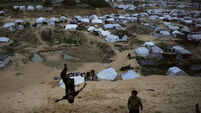Israel to pause fighting in three Gaza areas as concerns over hunger surge

International alarm over the humanitarian crisis in Gaza has increased and as Israel and the US appeared on Friday to abandon ceasefire negotiations with Hamas. Picture: AP
The Israeli military said it would pause fighting in three populated areas of Gaza for 10 hours a day and open secure routes for aid delivery to desperate Palestinians.
The steps are meant to address a surge in hunger in the territory as Israel faces a wave of international criticism over its conduct in the 21-month war.














